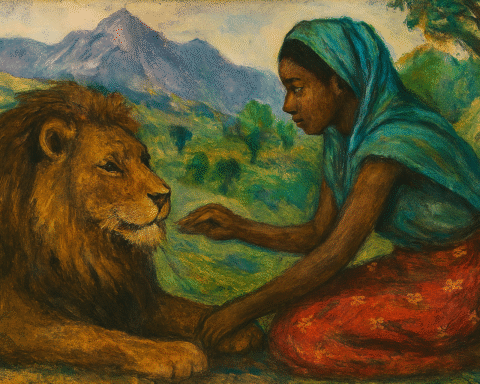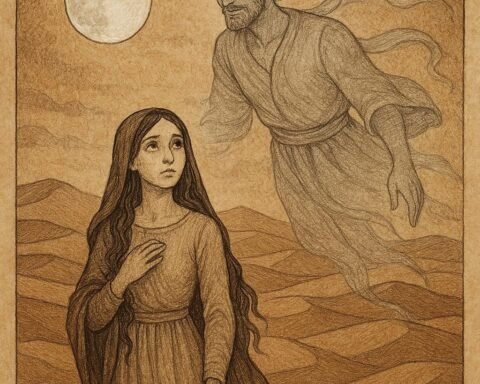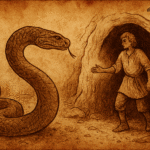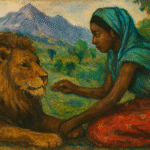Long ago, in the highlands of Ethiopia where the mountains rise like ancient guardians and the valleys breathe with green, there lived a woman who gave birth to a daughter. She named her child Penda-Who-Could-Not-Be-Shamed, a name that seemed bold, almost defiant. People whispered: “How can anyone live without shame?” Yet the mother spoke with certainty: “This child will never bow to disgrace.”
Penda grew into a young woman whose beauty and quiet strength became known throughout the land. When the king of the region heard of her, he made her his wife. But in the royal household, envy quickly stirred. The king’s other wives looked upon Penda with bitterness and plotted ways to humble her, to prove that her name was a lie.
The First Test: The Hill of Rice
The king assigned rice fields to his wives. To the others, he gave fertile swamp land where rice grew easily. But to Penda, he gave only a dry hill where no rice could thrive. His co-wives laughed, certain this task would shame her.
But Penda called upon Little Fly, her trusted messenger, to carry her question to her mother. Her mother advised: “Lift a stone upon that hill, place two grains of rice beneath it, and leave the rest to God.”
Penda obeyed. The next morning, she returned to her hill and saw a miracle: the slope shimmered with dancing stalks of rice, green and golden, swaying like a sea. When harvest time came, her field surpassed all the others. The co-wives stared in disbelief, their whispers sharp as thorns.
READ THIS: Fatuma: The Son Who Was Changed into a Girl
The Second Test: Guarding the Rice
At harvest, the wives set their children to guard the fields from hungry birds. But Penda had no children to help her. Again she sent Little Fly to her mother.
Her mother instructed: “Cut two dukume sticks of equal length, place them in the field, and then set them inside a gourd.”
Penda followed. By dawn, she found two living children within the gourd, clapping and singing joyfully. The birds dared not approach her field, for the children’s song filled the air with power. Penda’s rice was gathered in great abundance, filling the king’s storehouses until they overflowed.
The Third Test: Sour Milk from a Bull
Still the king sought to shame her. He demanded that each wife bring him sour milk. But Penda had no cow, only a bull. Her co-wives smirked, certain of her downfall.
Once again, Penda turned to her mother’s wisdom. She was told: “Catch the bull’s urine in a milking gourd, place it high upon the platform, and wait.”
By morning, the liquid had turned thick and creamy. Penda carried it proudly to the king. He tasted it, astonished, and muttered: “Indeed, I cannot shame her. Yet let us see what more can be done.”
The Fourth Test: Out-of-Season Fruit
The king then demanded challe fruit, though it was out of season. The co-wives believed this to be the end. But Penda’s mother instructed her: “Gather challe leaves and keep them covered.”
Though the tale cuts short here, it is clear that Penda’s obedience and her mother’s wisdom preserved her once again.
The Final Trial: The Bantaba
At last, the king called all his wives and their children to gather at the bantaba, the place of council and community. Penda refused to step forth until mats were laid from her house all the way to the gathering ground. First they laid bamboo, but she declined. Then they spread woven mats, but still she refused. Finally, they laid down cloth, rich and bright, and Penda emerged.
From her home she brought forth her two shining children, radiant with life. As she stepped upon the cloth, it was said that “the whole world turned green.” Grass and trees flourished instantly, the earth rejoiced, and the people gasped. The king could no longer deny the truth. He admitted that Penda could not be shamed, not by trickery nor by trial.
Moral of the Story
The tale of Penda teaches that true strength lies in faith, resilience, and wisdom passed from one generation to another. Envy may scheme, but it cannot undo what is divinely protected. Those who walk with patience and trust will always rise above disgrace.
Knowledge Check
1. Who is Penda-Who-Could-Not-Be-Shamed?
She is the heroine of the tale, an Ethiopian king’s wife who survives every attempt to disgrace her.
2. What was the first task given to Penda by the king?
She was told to grow rice on a barren hill, but through her mother’s guidance, the hill flourished with rice.
3. How did Penda obtain children to guard her rice field?
She followed her mother’s instructions by placing two dukume sticks into a gourd, which transformed into two living children.
4. What was miraculous about the bull’s urine?
When placed in a gourd, it turned into thick cream, fulfilling the king’s demand for sour milk.
5. What is the significance of mats being laid before Penda walked to the bantaba?
It symbolized respect and preparation for her final triumph, leading to the revelation of her radiant children.
6. What lesson does the story teach?
The story highlights perseverance, the value of maternal wisdom, and the truth that envy cannot overcome divine favor.
Source: Ethiopian folktale






